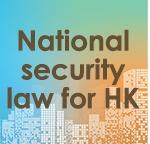HONG KONG - Hong Kong's High Court denied bail on Tuesday to the first person charged with inciting separatism and terrorism under the new National Security Law in the special administrative region.
In a 12-page decision, Court of First Instance Judge Alex Lee said defendant Tong Ying-kit, 23, should be denied bail because he could be a 'flight risk' or because of his 'risk of re-offending'.
"In my assessment, without considering Article 42 of the NSL (National Security Law), having given full credit to the applicant’s personal background and ties to Hong Kong, bail should be refused on either one of the two aforesaid conventional grounds, namely the “flight risk” and the “risk of re-offending”, not to say when both are present," Judge Lee said. "Therefore, the present application is dismissed."
He also said that the National Security Law did not introduce any drastic or significant changes to the existing law and practice regarding bail applications.
Tong was arrested after he carried a sign reading “Liberate Hong Kong, revolution of our times,” and drove his motorbike into police officers, knocking several down on a narrow street, police said. The government of the Asian financial hub has said the protest slogan connotes separatism or subversion under the new law.
Tong was among more than 300 demonstrators who were arrested by police on July 1, less than 24 hours after it was unveiled and took effect.
ALSO READ: High Court rules first security law defendant legally detained
He was denied bail last month, with the case adjourned to Oct 6 as prosecutors sought more time to collect evidence.
Tong then sought release from detention via a habeas corpus application, which determines whether a detention is lawful, but the High Court rejected his application on Friday. He again sought bail on Tuesday but his application was also dismissed.
The National Security Law provides for jail terms for up to life for secession, subversion, terrorism or collusion with foreign forces.
READ MORE: HK police make first arrests by invoking security law
With inputs from Agencies



